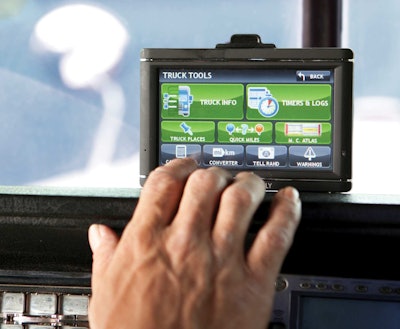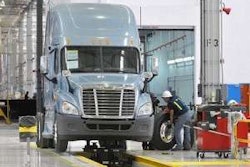 McLeod Software says the integration of LoadMaster with Rand McNally's IntelliRoute Dock2Dock allows carriers and private fleets using LoadMaster to access Rand McNally's proprietary address-to-address truck-drivable routing.
McLeod Software says the integration of LoadMaster with Rand McNally's IntelliRoute Dock2Dock allows carriers and private fleets using LoadMaster to access Rand McNally's proprietary address-to-address truck-drivable routing.Illinois Governor Pat Quinn has signed legislation aimed at enhancing truck safety in the state by making truck routing and restrictions more accessible to the commercial trucking industry. The new law also provides a program to educate professional truck drivers about the vast differences between truck and car GPS devices.
House Bill 1377, now signed into law, was the result of recommendations made by a State of Illinois task force charged with investigating the use of GPS technology as well as compliance with the Designated Truck Route System. The law, which goes into effect on Jan. 1, 2012, requires local jurisdictions to provide the most up-to-date truck route information to the Illinois Department of Transportation, which in turn will post this information online.
The state task force, made up of government and industry representatives, made three key recommendations that are part of the legislation:
• Merge together databases containing key truck routing data such as overpasses and legal restrictions;
• Require local jurisdictions to report their designated truck networks and preferred routes via a simplified reporting process; and
• Educate truck drivers on the differences between GPS devices designed for trucks and those used in cars.
Truck-specific restrictions for Illinois municipalities now will become more transparent to the public as well as to manufacturers of products designed to serve the commercial transportation industry. In addition, by educating truckers on appropriate routing for trucks instead of that for cars, this law is intended to increase safety on the roads and decrease the potential for dangerous bridge strikes that cause traffic congestion and infrastructure damage.
“The difference between a truck-specific GPS and a device designed for car routing is significant,” says Rep. Michael Zalewski, task force chairman and state representative for the 21st Illinois Congressional District. “Using the appropriate tool for the job will benefit the citizens of Illinois by reducing accidents, congestion and the costs of repairing infrastructure damaged by accidents involving commercial vehicles.”
John McAvoy, director of engineering for Rand McNally, was one of nine members of the task force appointed to make recommendations to the Illinois State Assembly. “There is a significant gap between what is readily available, and what should be reported and made available for manufacturers, to utilize in providing accurate truck-specific routing,” McAvoy says. “Providing vital height and weight information in an easily accessible format will benefit all who share the road.”
In addition to participation in the task force, Rand McNally has been engaged actively with the Federal Motor Carrier Safety Administration and the U.S. Department of Transportation on educating professional drivers on the benefits of using truck-specific routing products such as GPS devices and maps.










